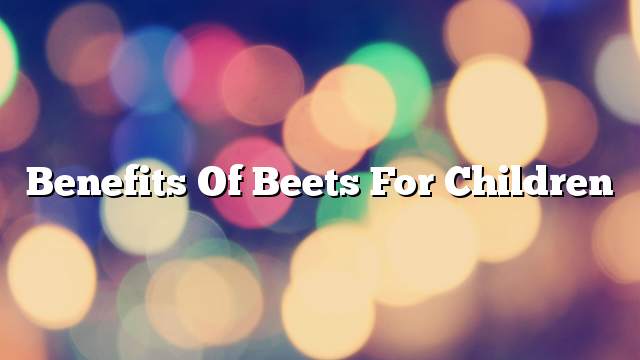Beets
Beetroot or beetroot from red root plants that grow under the soil. Man has relied on beetroot since ancient times to feed it and to treat many diseases because it contains many basic elements, namely: folic acid, calcium, magnesium, iron, copper , Potassium, sulfur, and vitamins A, C, and K, and an abundance of antioxidants, fiber, and protein.
Benefits of healthy beets
- Beet juice is a good diuretic and prevents constipation.
- Provides the body with many elements necessary for building and renewing tissues and cells.
- Strengthens the immune system and fights against chronic diseases such as: cardiovascular disease, kidney, arthritis, and eye problems.
- Treats various skin problems, such as acne, spots, and dark circles.
- Strengthens hair follicles, increases its length and curvature.
- Resists cancer cells, and is a natural solvent for calcium deposits.
- Prevents congenital malformations in the embryos.
- Protects the body from anemia and anemia caused by malnutrition.
- Strengthens liver cells and improves its function.
- Lowers the pressure level, improves blood circulation, and helps the body to relax.
- Increases the stress endurance of the athletes, and reduces the amount of oxygen lost during the exercise.
- Reduces blood sugar, and increases pancreatic sensitivity to insulin secretion.
Benefits of beets for children
- It provides the body with the minerals necessary for healthy and healthy growth of the child, such as calcium, iron, vitamins A, B, C and E. The lack of such vitamins in children leads to various diseases such as night blindness, rickets, bone lice, diarrhea and ulcers. Oral and other.
- Improves digestion, where digestion in children is weak, and it is advisable to eat digestible food quickly and easily, and eating beet improves the performance of the digestive system, and facilitates digestion.
- Improves liver health, where liver diseases, such as hepatitis or jaundice, affect the baby’s appetite, causing low weight in the child.
- Cleans the body, disinfects, cleans the kidneys and gallbladder.
- Iron deficiency is prevented in children, where beet is rich in iron, which increases through the production of blood cells in large numbers, and supply cells with oxygen properly, and the development of brain development properly.
Methods of eating beet
- It is recommended to start feeding baby beets in small amounts, after the sixth month of age, where the digestive system has evolved, and is more able to digest fruits and vegetables, by giving children two teaspoons of beet juice.
- Eat it raw, such as fruits and vegetables.
- Eat it in the form of juice.
- Add it to the salad dishes.
